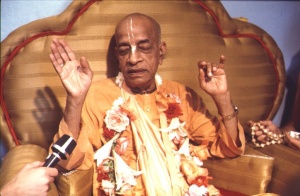SB 1.10.8: Difference between revisions
m (1 revision(s)) |
(Vanibot #0020: VersionCompareLinker - added a link to the Version Compare feature) |
||
| Line 1: | Line 1: | ||
{{info | {{info | ||
|speaker= | |speaker=Sūta Gosvāmī | ||
|listener=Sages of | |listener=Sages of Naimiṣāraṇya | ||
}} | }} | ||
[[Category:Srimad-Bhagavatam - Canto 01 Chapter 10|S08]] | |||
[[Category:Bhagavatam Verses Spoken by Suta Gosvami - Vanisource|011008]] | |||
<div style="float:left">'''[[Srimad-Bhagavatam]] - [[SB 1|First Canto]] - [[SB 1.10: Departure of Lord Krsna for Dvaraka|Chapter 10: Departure of Lord Kṛṣṇa for Dvārakā]]'''</div> | |||
<div style="float:right">[[File:Go-previous.png|link=SB 1.10.7]] '''[[SB 1.10.7]] - [[SB 1.10.9-10]]''' [[File:Go-next.png|link=SB 1.10.9-10]]</div> | |||
{{CompareVersions|SB|1.10.8|SB 1964|SB 1972-77}} | |||
{{RandomImage}} | |||
==== TEXT 8 ==== | ==== TEXT 8 ==== | ||
<div | <div class="verse"> | ||
āmantrya cābhyanujñātaḥ | :āmantrya cābhyanujñātaḥ | ||
pariṣvajyābhivādya tam | :pariṣvajyābhivādya tam | ||
āruroha rathaṁ kaiścit | :āruroha rathaṁ kaiścit | ||
pariṣvakto 'bhivāditaḥ | :pariṣvakto 'bhivāditaḥ | ||
</div> | </div> | ||
| Line 17: | Line 23: | ||
==== SYNONYMS ==== | ==== SYNONYMS ==== | ||
<div | <div class="synonyms"> | ||
''āmantrya''—taking permission; ''ca''—and; ''abhyanujñātaḥ''—being permitted; ''pariṣvajya''—embracing; ''abhivādya''—bowing down at the feet; ''tam''—unto Mahārāja Yudhiṣṭhira; ''āruroha''—ascended; ''ratham''—the chariot; ''kaiścit''—by someone; ''pariṣvaktaḥ''—being embraced; ''abhivāditaḥ''—being offered obeisances. | |||
</div> | </div> | ||
| Line 24: | Line 30: | ||
==== TRANSLATION ==== | ==== TRANSLATION ==== | ||
<div | <div class="translation"> | ||
Afterwards, when the Lord asked permission to depart and the King gave it, the Lord offered His respects to Mahārāja Yudhiṣṭhira by bowing down at his feet, and the King embraced Him. After this the Lord, being embraced by others and receiving their obeisances, got into His chariot. | Afterwards, when the Lord asked permission to depart and the King gave it, the Lord offered His respects to Mahārāja Yudhiṣṭhira by bowing down at his feet, and the King embraced Him. After this the Lord, being embraced by others and receiving their obeisances, got into His chariot. | ||
</div> | </div> | ||
| Line 31: | Line 37: | ||
==== PURPORT ==== | ==== PURPORT ==== | ||
<div | <div class="purport"> | ||
Mahārāja Yudhiṣṭhira was the elder cousin of Lord Kṛṣṇa, and therefore while departing from him the Lord bowed down at the King's feet. The King embraced Him as a younger brother, although the King knew perfectly well that Kṛṣṇa is the Supreme Personality of Godhead. The Lord takes pleasure when some of His devotees accept Him as less important in terms of love. No one is greater than or equal to the Lord, but He takes pleasure in being treated as younger than His devotees. These are all transcendental pastimes of the Lord. The impersonalist cannot enter into the supernatural roles played by the devotee of the Lord. Thereafter Bhīma and Arjuna embraced the Lord because they were of the same age, but Nakula and Sahadeva bowed down before the Lord because they were younger than He. | Mahārāja Yudhiṣṭhira was the elder cousin of Lord Kṛṣṇa, and therefore while departing from him the Lord bowed down at the King's feet. The King embraced Him as a younger brother, although the King knew perfectly well that Kṛṣṇa is the Supreme Personality of Godhead. The Lord takes pleasure when some of His devotees accept Him as less important in terms of love. No one is greater than or equal to the Lord, but He takes pleasure in being treated as younger than His devotees. These are all transcendental pastimes of the Lord. The impersonalist cannot enter into the supernatural roles played by the devotee of the Lord. Thereafter Bhīma and Arjuna embraced the Lord because they were of the same age, but Nakula and Sahadeva bowed down before the Lord because they were younger than He. | ||
</div> | </div> | ||
__NOTOC__ | |||
<div style="float:right; clear:both;">[[File:Go-previous.png|link=SB 1.10.7]] '''[[SB 1.10.7]] - [[SB 1.10.9-10]]''' [[File:Go-next.png|link=SB 1.10.9-10]]</div> | |||
__NOTOC__ | |||
__NOEDITSECTION__ | |||
Revision as of 08:35, 25 May 2020

A.C. Bhaktivedanta Swami Prabhupada
TEXT 8
- āmantrya cābhyanujñātaḥ
- pariṣvajyābhivādya tam
- āruroha rathaṁ kaiścit
- pariṣvakto 'bhivāditaḥ
SYNONYMS
āmantrya—taking permission; ca—and; abhyanujñātaḥ—being permitted; pariṣvajya—embracing; abhivādya—bowing down at the feet; tam—unto Mahārāja Yudhiṣṭhira; āruroha—ascended; ratham—the chariot; kaiścit—by someone; pariṣvaktaḥ—being embraced; abhivāditaḥ—being offered obeisances.
TRANSLATION
Afterwards, when the Lord asked permission to depart and the King gave it, the Lord offered His respects to Mahārāja Yudhiṣṭhira by bowing down at his feet, and the King embraced Him. After this the Lord, being embraced by others and receiving their obeisances, got into His chariot.
PURPORT
Mahārāja Yudhiṣṭhira was the elder cousin of Lord Kṛṣṇa, and therefore while departing from him the Lord bowed down at the King's feet. The King embraced Him as a younger brother, although the King knew perfectly well that Kṛṣṇa is the Supreme Personality of Godhead. The Lord takes pleasure when some of His devotees accept Him as less important in terms of love. No one is greater than or equal to the Lord, but He takes pleasure in being treated as younger than His devotees. These are all transcendental pastimes of the Lord. The impersonalist cannot enter into the supernatural roles played by the devotee of the Lord. Thereafter Bhīma and Arjuna embraced the Lord because they were of the same age, but Nakula and Sahadeva bowed down before the Lord because they were younger than He.